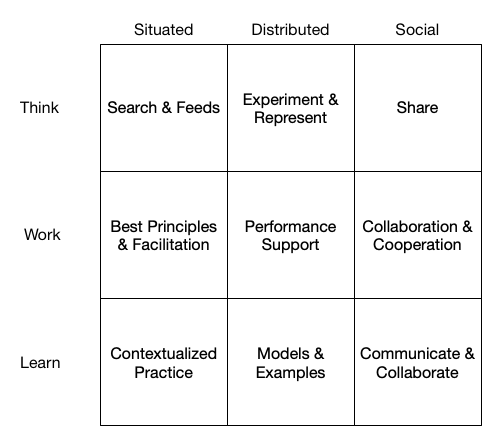In my past two posts, I first looked at cognitions (situated, distributed, social) by contexts (think, work, and learn), and then the reverse. And, having filled out the matrixes anew, they weren’t quite the same. And that, I think, is the benefit of the exercise, a chance to think anew. So what emerged? Here’s the result of reconciling cognitions and contexts.
 So, taking each cell back in the original pass of cognitions by contexts, what results? I took the Think row to, indeed, be Harold Jarche’s Seek > Sense > Share model (ok, my interpretation). We have in Situated, the feeds you’ve set up to see, and then the particular searches you need in the current context. Then, of course, you experiment and represent as ways to externalize thinking for Distributed. Finally, you share Socially.
So, taking each cell back in the original pass of cognitions by contexts, what results? I took the Think row to, indeed, be Harold Jarche’s Seek > Sense > Share model (ok, my interpretation). We have in Situated, the feeds you’ve set up to see, and then the particular searches you need in the current context. Then, of course, you experiment and represent as ways to externalize thinking for Distributed. Finally, you share Socially.
For Work, not practices but principles (and the associated practices therefrom) as well as facilitation to support Situated Work. Performance support is, indeed, the Distributed support for Work. And Socially, you need to collaborate on specific tasks and cooperate in general.
Finally, for Learning, for a Situated world you need (spread) contextualized practice to support appropriate abstraction of the principles. You want models and examples to support performance in the practice, as Distributed resources. And, finally, for Social Learning, you need to communicate (e.g. discussions) and collaborate (group projects).
What’s changed is that I added search and feeds, and moved experiment, in the Think row. I went to principles from practices to support performance in ambiguity, left performance support untouched, and stayed with collaborations and cooperation instead of just shared representations (they’re part of collaborate). And, finally, I made practice about contexts, went from blended learning to support materials for learning, and interpreted social assignments as communicating and collaborating.
The question is, what does this mean? Does it give us any traction? I’m thinking it does, as it shifts the focus in what we’re doing to support folks. So I think it was interesting and valuable (to my thinking, at least ;) to consider reconciling cognitions and contexts.
Leave a Reply